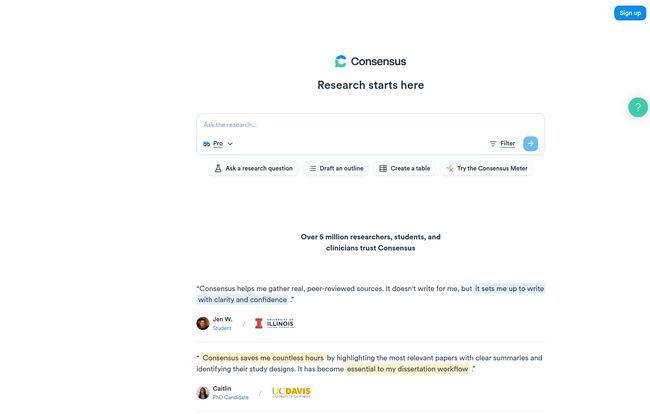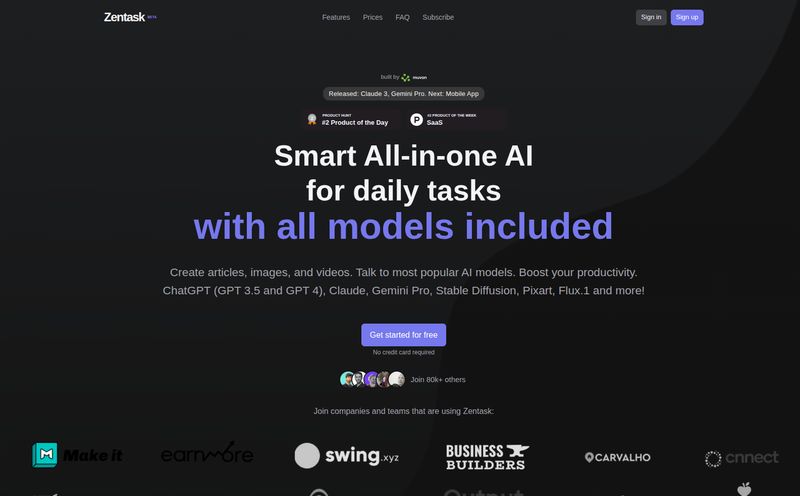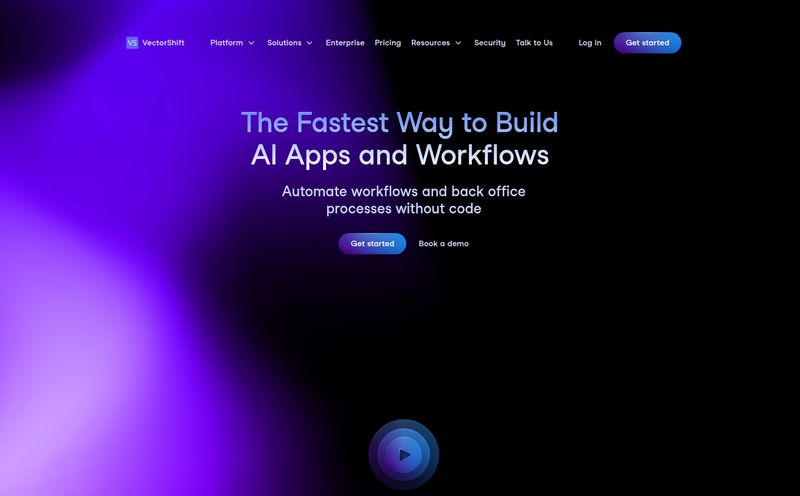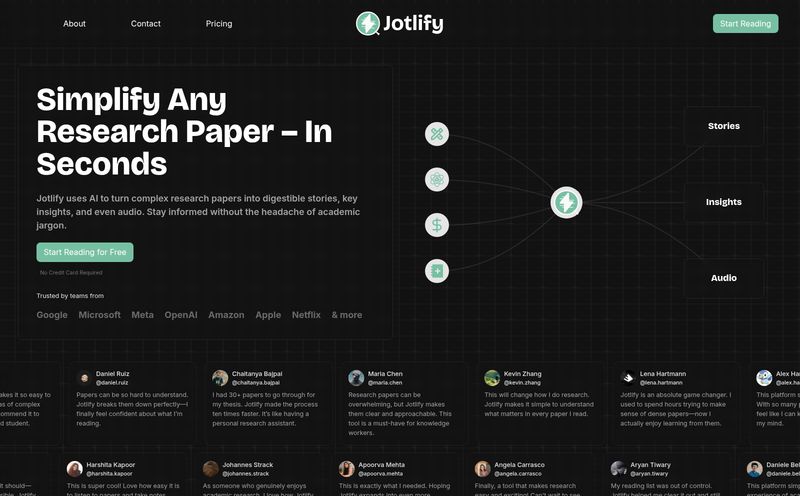As someone who lives and breathes SEO and content creation, I've seen the AI wave wash over everything. And look, I get it. Tools like ChatGPT are incredible for brainstorming, outlining, and even drafting. But when it comes to finding cold, hard facts—especially for topics that need to be backed by science—using a general chatbot can feel like playing Russian roulette with your credibility. I once asked one for sources on a nutritional topic and it confidently gave me a link to a study that... didn't exist. Yeah. Awkward.
It’s a huge problem, especially with Google's increasing focus on Experience, Expertise, Authoritativeness, and Trustworthiness (E-E-A-T). You can’t build trust on flimsy, AI-hallucinated “facts.”
So for months, I've been on the hunt for something better. A tool that marries the power of AI with the rigor of actual scientific research. And I think I’ve finally found it. It’s called Consensus, and honestly, it’s been a bit of a game-changer for my workflow.

Visit Consensus
What Even Is Consensus? (And Why Should You Care?)
Think of it like this: Consensus is a search engine, but instead of crawling the entire web, it focuses exclusively on a massive database of over 200 million peer-reviewed scientific papers. It's not here to write you a poem or plan your vacation. Its one and only job is to find evidence-based answers to your questions, directly from the source.
The magic is in how it does it. You don't just get a list of links like on Google Scholar. You ask a question, like "Does mindfulness meditation reduce anxiety?" and its AI gets to work. It reads through relevant papers and distills the findings into a simple, easy-to-digest summary. And—here’s the most important part—every single claim is directly linked to the paper it came from. No hallucinations. No made-up studies. Just verifiable science.
This is the fundamental difference. While a large language model like ChatGPT is designed to predict the next word in a sentence, Consensus is designed for extraction and synthesis. It’s not guessing; it’s reporting. For anyone who needs to back up their claims, from a student writing a thesis to a health blogger writing about supplements, that distinction is everything.
A Look at the Consensus Features I Actually Use
A tool can have a million features, but what matters is what you actually find yourself using day-to-day. After kicking the tires on Consensus for a while, a few features have become absolutely indispensable to me.
The "Consensus Meter": Your Instant BS Detector
This might be my favorite little gadget in the whole platform. When you ask a yes/no question, the Consensus Meter gives you a quick visual breakdown of what the research says. You'll see a percentage of papers that suggest 'Yes', 'No', or 'Possibly'. It's like a scientific truth-o-meter. For example, asking about a controversial health claim might show you that only 15% of studies support it, while 85% are inconclusive. Instantly, you have a nuanced perspective that would have taken hours of manual research to uncover.
"Study Snapshot" and "Pro Analysis": Your AI Research Assistant
Let's be honest, nobody has time to read a dozen 30-page research papers. The Study Snapshot feature is a lifesaver. With one click, you get a pop-up that summarizes the key details of a paper: the abstract, what the study designed was, the sample size, and its main outcomes. It’s the ultimate TL;DR for science.
The Pro Analysis feature takes it a step further. It uses GPT-4 to create a more detailed synthesis of findings from multiple papers. You can ask it to draft a paragraph for a blog post, create a bulleted list of key takeaways, or even adopt a specific tone. It’s like having a brilliant (and very fast) research assistant on standby.
Smarter Searching with Filters and Quality Checks
This is where you can really tell Consensus is built for serious researchers. You can filter your search results by things like study type (e.g., Randomized Controlled Trial, Meta-Analysis), sample size, and even specific journals. You can also see quality indicators at a glance, like how many times a paper has been cited. This helps you quickly separate the landmark studies from the less impactful ones. It’s a level of control you just dont get from a standard search engine.
So, Who Is This Tool Really For?
While I'm looking at it through the lens of an SEO and content creator, its applications are broad. I can see it being incredibly useful for:
- Students and Academics: This is a no-brainer. It dramatically speeds up literature reviews and helps find supporting evidence for dissertations and papers.
- Content Marketers and SEOs: For anyone creating content in the health, finance (YMYL - Your Money or Your Life) or scientific spaces, this is your E-E-A-T secret weapon. You can build articles on a foundation of solid, citable evidence.
- Health & Wellness Professionals: Doctors, nutritionists, and personal trainers can quickly find the latest research on treatments, supplements, and training methodologies to give their clients the best advice.
- The Genuinely Curious: If you're just the kind of person who falls down Wikipedia rabbit holes and wants real answers to your questions, this is a much more reliable companion than a generic AI or a chaotic social media feed.
Let's Talk Money: The Consensus Pricing Plans
Alright, the all-important question: what's this going to cost? The good news is, you can get started for free. The pricing structure is pretty straightforward.
The Free plan is surprisingly generous. You get 10 GPT-4 powered analyses, 10 Study Snapshots, and 10 "Ask Paper" messages per month, plus unlimited searching. This is more than enough to get a feel for the platform and use it for occasional research.
The Premium plan is where it gets serious. For $8.99 per month (when billed annually), you get unlimited everything. Unlimited analyses, unlimited snapshots, unlimited bookmarks—the works. If you're a student, researcher, or content creator who needs to do this kind of work regularly, the price is an absolute steal in my opinion. It pays for itself in saved time within the first couple of hours.
They also offer Teams and Enterprise plans for organizations that need centralized billing and management for multiple users. This seems ideal for universities, research institutions, or content marketing agencies.
Final Thoughts: Is Consensus Worth It?
In a world drowning in information and misinformation, Consensus feels like a life raft. It's not perfect—you still need to apply your own critical thinking and read the source material for deep understanding. It's a tool, not a replacement for your brain. But it’s an incredibly powerful tool.
It bridges the gap between the speed of AI and the authority of science. It helps you work faster without sacrificing integrity. For me, that’s not just valuable; it's essential. The fact that I can pull direct, citable evidence for my articles in minutes instead of hours has fundamentally improved my work. So yeah, it's worth it. It has my full-throated endorsement.
Frequently Asked Questions (FAQ)
- Is Consensus better than Google Scholar?
- They serve different purposes. Google Scholar is a fantastic library for finding papers. Consensus is an AI-powered tool that reads and synthesizes the findings from those papers for you. I use both: Google Scholar for broad discovery, Consensus for getting quick, synthesized answers to specific questions.
- Can I trust the AI summaries from Consensus?
- Yes, because they are grounded in the source material. Every insight is directly extracted from a paper and includes a citation, so you can always check the source yourself. It's designed to avoid the "hallucinations" or made-up facts common in other AI models.
- Is Consensus really free to use?
- Yes, there is a robust free plan that offers unlimited searches and a generous monthly allowance of its advanced AI features. This is perfect for trying it out or for light users.
- How does Consensus avoid the "hallucinations" of other AI?
- Consensus uses a process called Retrieval-Augmented Generation (RAG). Instead of making up information, its AI is forced to pull answers and data directly from the text of the scientific papers in its database, and it provides the citation for every piece of information.
- What kinds of topics can I research on Consensus?
- Pretty much anything covered by scientific research! The homepage shows examples from AI and machine learning, medicine, psychology, nutrition, climate science, economics, and more. If there are peer-reviewed papers about it, Consensus can likely find them.
- Who is behind Consensus?
- Consensus was founded by Eric Olson and Christian Salem. It operates as a public benefit corporation, with a mission to make scientific knowledge accessible to everyone, which I think adds to its credibility and trustworthiness.
References and Sources
For more details on features and pricing, you can visit the official website and its pricing page directly.
- Consensus Official Website: https://consensus.app/
- Consensus Pricing Page: https://consensus.app/home/pricing



